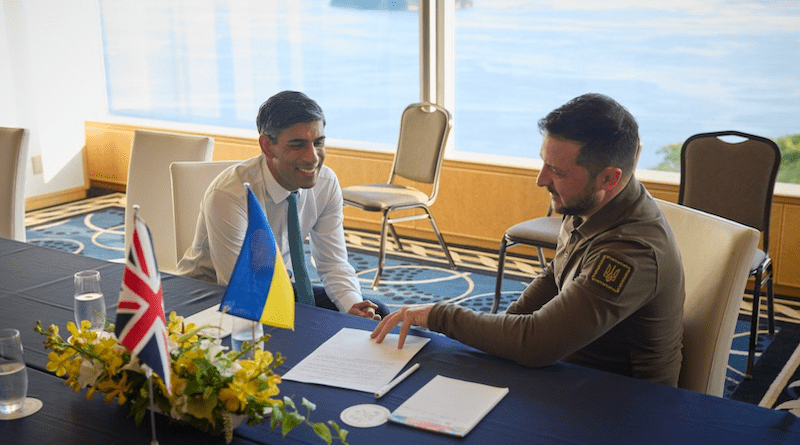Zelenskyy Meets Leaders In Hiroshima As G7 Agrees On F-16s For Ukraine
By VOA
By Patsy Widakuswara and Carolyn Presutti
Ukrainian President Volodymyr Zelenskyy arrived in Hiroshima, Japan, Saturday afternoon to participate in the Group of Seven leaders’ summit — the farthest he has been outside of his war-torn country since Russia’s invasion began in February last year.
Zelenskyy met with British Prime Minister Rishi Sunak, who greeted him with an embrace and slapped him on the back saying, “Good to see you. You made it.” Zelenskyy and Sunak sat at a rectangular table, pulling their chairs together side-by-side, leaning in to face each other. “Really great to see you,” Sunak reiterated as photographers snapped images, the leaders engaging in small talk, before beginning their closed-door meeting, apart from the media.
The series of bilateral talks the Ukrainian president held on the sidelines of the G7 summit continued with Indian Prime Minister Narendra Modi. He and Zelenskyy sat across from each other as the Indian leader assured Zelenskyy his country will provide help to Ukraine saying, “India, and I personally, will definitely do everything we can.”
Modi, representing a country with historical ties to Russia, elaborated, “I do not consider it to be just an issue of economy or politics for me. It is an issue of humanity and humanitarian values.” Modi is set to host the Group of 20 largest economies in New Delhi later this year.
Next, French President Emmanuel Macron was ushered in to meet Zelenskyy, extending his arm across the table for a handshake. Macron talked about the “unique opportunity” for Zelenskyy to “convey your message and share your views” at the G7, and he went on to proclaim, “I mean, I do believe that it can be a game changer.”
Zelenskyy is expected to meet with President Joe Biden on Sunday in Japan. Both leaders are scheduled to hold separate news conferences later that day.
Ahead of Zelenskyy’s participation at the G7, the group announced it will provide Ukraine with F-16 fighter jets and train Ukrainian pilots to fly them. Macron announced earlier this week that France is ready to train Ukrainian pilots on the F-16s after Zelenskyy met with Macron, in a surprise visit to Paris during his European tour building more support for Ukraine’s war efforts. At the beginning of Saturday’s bilateral meeting, Zelenskyy told Macron, “I want to thank you and all the partners about this decision, about training mission, which are really, really very, very important.”
“Japan. G7. Important meetings with partners and friends of Ukraine. Security and enhanced cooperation for our victory. Peace will become closer today,” he wrote on Twitter upon his arrival. Asked by reporters if it was a good day for Ukraine, the Ukrainian leader smiled, nodded and said, “Thank you so much.”
In a statement provided to VOA, a senior administration official said Friday that Biden informed G7 leaders that the United States will support a joint effort with allies and partners to train Ukrainian pilots on fourth-generation fighter aircraft, including F-16s, to further strengthen and improve the capabilities of the Ukrainian air force. The move was a shift from Biden’s monthslong refusal of Zelenskyy’s request for the aircraft. The training, set to begin in the coming weeks, will take place at sites in Europe and require months to complete, said the official.
The Ukrainian leader welcomed Biden’s decision, saying in a tweet it would “greatly enhance our army in the sky.”
This year’s G7 summit is being held in Hiroshima, Japan, the first city to be attacked by an atomic bomb, underlining the nuclear threat of Russia’s war with Ukraine. Suzanne Loftus is a research fellow specializing in Russian foreign policy at the Quincy Institute, a think tank that promotes diplomacy over war. Loftus says the G7 meeting does nothing to “prioritize diplomacy as a solution” to ending the war.
“The West is calling for unconditional Russian surrender,” and Loftus predicts that will not happen, leading to one of two outcomes: “a long-term war of attrition, where Russia would have the upper hand based on the size of its manpower, or rising escalation,” which she says could lead to nuclear attacks.
Confirmation of Zelenskyy’s in person attendance to the summit earlier this week came as G7 leaders from the U.S., Canada, France, Germany, Italy, the U.K., Japan and the European Union, reaffirmed their “commitment to stand together against Russia’s illegal, unjustifiable, and unprovoked war of aggression against Ukraine.”
In a statement, the group pledged to “mobilize all our policy instruments and, together with Ukraine, make every effort to bring a comprehensive, just and lasting peace in Ukraine as soon as possible,” underscoring that it cannot be realized without “the complete and unconditional withdrawal of Russian troops.”

